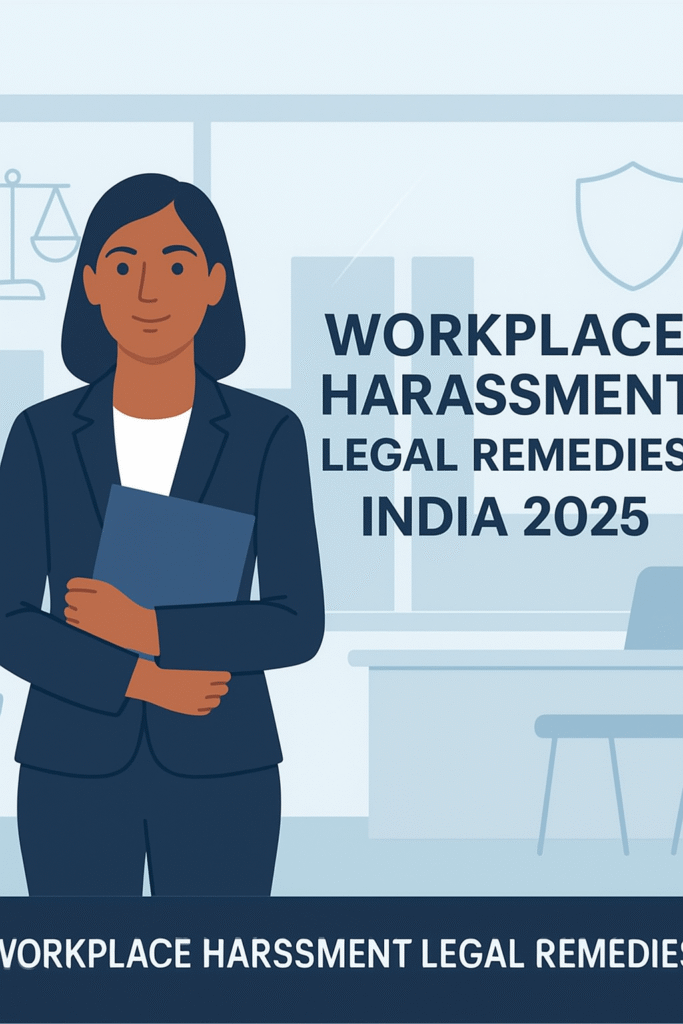Harassment at the workplace remains a harsh reality for many employees in India. Whether it is sexual harassment, bullying, discrimination, or intimidation, Indian law clearly prohibits harassment and offers employees robust legal remedies.
This article explains what amounts to workplace harassment, your rights, and the updated legal steps you can take under Indian law as of July 2025.
What is Workplace Harassment?
Workplace harassment can take many forms, including:
- Sexual harassment: Unwelcome physical contact, sexually coloured remarks, requests for sexual favours, or any unwelcome sexual conduct.
- Verbal abuse or bullying: Humiliating remarks, insults, threats, or repeated offensive behaviour.
- Discrimination: Unfair treatment based on gender, caste, religion, disability, sexual orientation, or other protected grounds.
- Retaliation: Punishing or intimidating someone for raising a complaint or participating in an inquiry.
Which Laws Protect You? (Updated for 2025)
1. The Sexual Harassment of Women at Workplace (Prevention, Prohibition and Redressal) Act, 2013 (POSH Act)
Still the primary law for sexual harassment cases at work.
- Key update (2024 Amendment):
- The Internal Complaints Committee (now officially called the Internal Committee or IC) must submit an Annual Report to the District Officer with details of complaints received, disposed, and action taken.
- Employers failing to form an IC or comply with inquiry timelines can face increased penalties and suspension of business licenses under the updated compliance rules.
Every workplace with 10 or more employees must have an IC.
2. BNS
Certain forms of harassment are also crimes under the BNS
• Section 73: Sexual harassment
• Section 76: Stalking
• Section 78: Insulting the modesty of a woman
• Sections 131–134: Criminal intimidation
• Sections 354–357: Defamation
3. Labour and Employment Laws
For non-sexual harassment like bullying, threats, or unfair dismissal:
- Industrial Employment (Standing Orders) Act, 1946.
- State Shops and Establishments Acts.
- Service Conduct Rules for government and PSU employees.
These require employers to ensure fair and respectful treatment at the workplace.
4. Fundamental Rights — Constitution of India
- Article 14: Right to Equality.
- Article 15: Protection against discrimination.
- Article 19(1)(g): Right to practice any profession.
- Article 21: Right to life and dignity.
What Steps Should You Take?
1. Record Everything
Write down dates, times, what happened, where, who was present. Save emails, messages, CCTV clips — evidence is key.
2. Report Internally
If it’s sexual harassment:
- File a written complaint with your IC within 3 months (can be extended by the IC for valid reasons).
- The IC must complete its inquiry within 90 days and share its findings with both parties.
- The employer must act on the IC’s recommendations within 60 days.
If your organisation does not have an IC or if your complaint is against senior management or an IC member:
- Approach the Local Complaints Committee (LCC) set up by the District Officer. Every district must have an LCC under the POSH Act.
3. Lodge an FIR (If Criminal Offence)
If you face threats, stalking, assault, or any criminal act, you can lodge a First Information Report (FIR) at your nearest police station under the relevant IPC sections. No employer’s permission is needed.
4. Approach the Labour Commissioner
For harassment not involving sexual misconduct (like bullying, unfair termination, unpaid dues), you can:
- File a complaint with the Labour Commissioner.
- Seek conciliation or legal notice.
- File an industrial dispute if necessary.
5. Seek Civil Remedies
In some cases, you may file a civil suit for:
- Damages for mental harassment.
- Wrongful dismissal.
- Defamation, if false accusations harm your reputation.
Official Resources
- POSH Act (Ministry of Women & Child Development): wcd.nic.in
- National Commission for Women: ncw.nic.in — For help in sexual harassment matters.
Your Rights — Know Them
- You have the right to a safe workplace.
- You have the right to complain without fear of retaliation.
- You have the right to confidentiality during the POSH inquiry.
- You have the right to approach police and courts if needed.
Key Takeaway
No one should suffer harassment in silence. The law is clear and protective — use it.
Keep evidence, follow due process, and seek help if your employer fails to act.
Consult a lawyer if your complaint is ignored or mishandled — you have the right to escalate.
Disclaimer
This article is for informational purposes only. For advice on your specific situation, consult a qualified legal professional.

